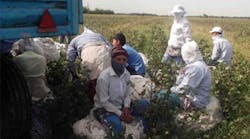In an effort to work to eradicate modern slavery in cotton harvesting and yarn production by enabling yarn spinners to identify and eliminate cotton produced with forced labor, the Responsible Sourcing Network (RSN) launched, on September 1, a new initiative called YESS: Yarn Ethically & Sustainably Sourced.
Cotton produced by forced labor, documented in at least nine countries according to the U.S. Department of Labor, makes its way into clothing and home goods sold by major brands and retailers.
The initiative has received the support of brands and retailers, such as Adidas, Hudson’s Bay Co., and Woolworths Holdings. These companies and many other have endorsed a Statement of Support which acknowledges that it is important for companies to work together to create and advance an international ethical and sustainable cotton value chain.
This program will pilot in India and Bangladesh, which have numerous spinning mills and are highly affected by forced labor.
“Although many of our corporate Cotton Pledge signatories know that this is a vulnerable spot in their supply chains, they haven’t known how to address the problem,” said Patricia Jurewicz, Director of RSN and creator of YESS. “YESS is providing an innovative solution around which the entire industry can collaborate and contribute.” The program is project of the nonprofit As You Sow.
YESS, a project of the nonprofit As You Sow, will assist companies to comply with new anti-slavery regulations, minimize verification costs, establish an industry-wide traceability approach, and manage a global list of verified spinners.
While there are numerous projects that engage farmers and factory workers to improve labor conditions, YESS is one of just a few initiatives working directly with spinning mills. Located in the middle of the supply chain, spinning mills are uniquely positioned to identify cotton produced with forced labor and prevent it from entering corporate supply chains.
This initiative identifies a gap in transparency between where forced labor occurs in the cotton fields and the facilities in which different cottons are blended together. YESS aims to close this gap by focusing on yarn spinning mills in the supply chain, and establishing a training, assessment, and verification process. Identifying and addressing the forced and bonded labor of young women in spinning mills in southern India will also be incorporated into this initiative. YESS plans to coordinate its activities with industry-wide sustainable and ethical sourcing platforms.
“It is an open secret that the garment and textile supply chain is rife with forced labor and other human rights abuses. However, it is not inevitable that this should be the case. In Uzbekistan, we have seen how economic and political pressure has helped remove the youngest children from the cotton fields,” said Dr. Aidan McQuade, Director of Anti-Slavery International. "The YESS initiative represents an honorable effort to clean up opaque parts of the system. It is vital that businesses work with initiatives like YESS to establish transparency and promote workers' human rights."
As new laws require companies to report on their actions to address modern slavery and human trafficking, more consumers demand ethical manufacturing of their products, and investors increase benchmarking companies against one another on their human rights’ records, YESS will be a vital tool for compliance and responsible sourcing.
“This will have a global impact once it is fully implemented. The time is now for the industry to join together and address these forced labor challenges.” said Scot Leonard, Co-Founder and CEO of Indigenous, one of the YESS Working Group members.



